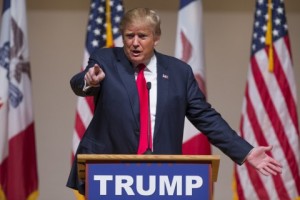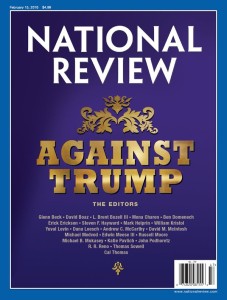 I want to revisit the important message of National Review‘s issue “Against Trump,” but first I want to make sure no one missed a statement Trump made while speaking Saturday at Dordt College, a Christian Reformed institution in Iowa.
I want to revisit the important message of National Review‘s issue “Against Trump,” but first I want to make sure no one missed a statement Trump made while speaking Saturday at Dordt College, a Christian Reformed institution in Iowa.
Attempting to be funny, Trump commented that his supporters are so loyal that he could stand in the middle of Fifth Avenue in New York and shoot somebody and still not lose his voters.
According to an eyewitness account, the joke fell short—some muffled laughter and a good number of people shaking their heads. I don’t know what bothers me more, that Trump would say such a thing or that he is probably correct about a sizable segment of his supporters.
I echo the concern of one evangelical commentator who concluded, “There is something deeply disturbing about a candidate who would say this . . . and Evangelicals who would support him.”
Back to National Review.
I hope my readers will take the time to wade through the articles in this latest issue, both the official editorial and the various essays from individual contributors.
Some have already criticized NR on various grounds. The most common ones I’ve seen have been based on perceived inconsistencies with positions NR has taken in the past. I argue that is irrelevant; one must look at the present topic—Donald Trump’s candidacy—and judge on its merits alone.
While there may be some critiques based on the issues themselves, I have yet to see them; the focus seems to be that NR has unfairly trashed the frontrunner.
 There is no room in this post to quote extensively from the varied views of Trump that are expressed in the “Against Trump” collection, so I will limit myself to excerpts from what I believe is a factually based and cogent presentation in the main editorial.
There is no room in this post to quote extensively from the varied views of Trump that are expressed in the “Against Trump” collection, so I will limit myself to excerpts from what I believe is a factually based and cogent presentation in the main editorial.
The editors at NR begin with their main thesis:
Trump is a philosophically unmoored political opportunist who would trash the broad conservative ideological consensus within the GOP in favor of a free-floating populism with strong-man overtones.
casually suggested a few weeks ago a war crime “killing terrorists’ families” as a tactic in the war on terror. For someone who wants to project strength, he has an astonishing weakness for flattery, falling for Vladimir Putin after a few coquettish bats of the eyelashes from the Russian thug. All in all, Trump knows approximately as much about national security as he does about the nuclear triad–which is to say, almost nothing.
Trump has shown no interest in limiting government, in reforming entitlements, or in the Constitution. . . .
His obsession is with “winning,” regardless of the means–a spirit that is anathema to the ordered liberty that conservatives hold dear and that depends for its preservation on limits on government power.
Trump’s record as a businessman is hardly a recommendation for the highest office in the land. For all his success, Trump inherited a real-estate fortune from his father. Few of us will ever have the experience, as Trump did, of having Daddy-O bail out our struggling enterprise with an illegal loan in the form of casino chips.Trump’s primary work long ago became less about building anything than about branding himself and tending to his celebrity through a variety of entertainment ventures, from WWE to his reality-TV show, The Apprentice. His business record reflects the often dubious norms of the milieu: using eminent domain to condemn the property of others; buying the good graces of politicians–including many Democrats–with donations.
If Trump were to become the president, the Republican nominee, or even a failed candidate with strong conservative support, what would that say about conservatives?The movement that ground down the Soviet Union and took the shine, at least temporarily, off socialism would have fallen in behind a huckster. The movement concerned with such “permanent things” as constitutional government, marriage, and the right to life would have become a claque for a Twitter feed.
 In its concluding paragraph, the editorial summons the spirit of its founder, William F. Buckley, who began the enterprise in the 1950s with the declaration that NR would be voice standing athwart history yelling “Stop.”
In its concluding paragraph, the editorial summons the spirit of its founder, William F. Buckley, who began the enterprise in the 1950s with the declaration that NR would be voice standing athwart history yelling “Stop.”Some conservatives have made it their business to make excuses for Trump and duly get pats on the head from him. Count us out. Donald Trump is a menace to American conservatism who would take the work of generations and trample it underfoot in behalf of a populism as heedless and crude as the Donald himself.
